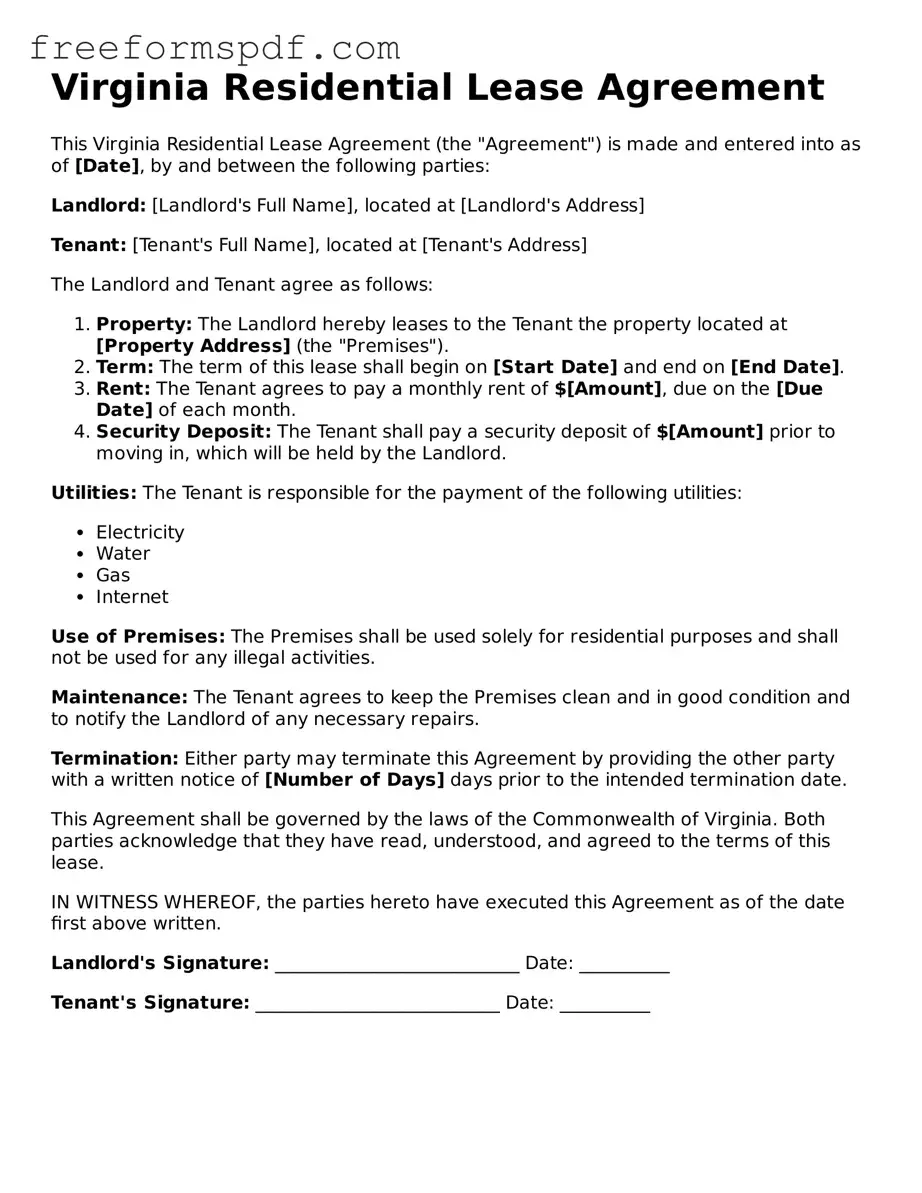Attorney-Verified Residential Lease Agreement Document for Virginia State
Common mistakes
-
Incomplete Information: Many individuals fail to provide all required details. This includes missing names, addresses, or contact information for both the landlord and tenant. Every blank must be filled to ensure clarity and legality.
-
Incorrect Dates: Entering the wrong lease start and end dates can lead to confusion. It is crucial to double-check these dates to avoid disputes later on.
-
Ignoring State-Specific Requirements: Some people overlook specific Virginia laws that apply to residential leases. Understanding these requirements is essential for compliance and protection.
-
Failure to Sign: A common mistake is neglecting to sign the lease. Without signatures from both parties, the agreement is not legally binding. Always ensure that both landlord and tenant have signed and dated the document.
Learn More on This Form
-
What is a Virginia Residential Lease Agreement?
A Virginia Residential Lease Agreement is a legally binding document that outlines the terms and conditions between a landlord and tenant for renting a residential property in Virginia. This agreement includes essential details such as the rental amount, duration of the lease, security deposit requirements, and responsibilities of both parties. It serves to protect the rights of both landlords and tenants by clearly defining expectations and obligations.
-
What key elements should be included in the lease agreement?
Several critical components should be present in a Virginia Residential Lease Agreement. These include:
- Names of all tenants and the landlord.
- Property address and description.
- Lease term, specifying the start and end dates.
- Monthly rent amount and payment due date.
- Security deposit details, including the amount and conditions for its return.
- Rules regarding maintenance and repairs.
- Provisions for terminating the lease early, if applicable.
Including these elements ensures clarity and reduces the likelihood of disputes in the future.
-
How does a tenant terminate a lease in Virginia?
In Virginia, a tenant can terminate a lease by providing written notice to the landlord. The notice period typically depends on the lease terms. For month-to-month leases, a 30-day notice is generally required. For fixed-term leases, tenants may need to wait until the lease expires unless there are specific provisions that allow for early termination. It's essential for tenants to review their lease agreement for any specific requirements regarding termination.
-
What happens if a tenant does not pay rent on time?
If a tenant fails to pay rent on time, the landlord may issue a notice of non-payment. This notice typically provides a grace period, during which the tenant can pay the overdue rent without facing further consequences. If the tenant does not pay within this period, the landlord may initiate eviction proceedings. It's crucial for tenants to communicate with their landlords if they anticipate difficulty in making a rent payment, as some landlords may be willing to negotiate a payment plan.
Misconceptions
Understanding the Virginia Residential Lease Agreement is crucial for both landlords and tenants. However, several misconceptions can lead to confusion and potential disputes. Here are ten common misconceptions about this important document:
-
All leases must be in writing.
While it is highly recommended to have a written lease for clarity and legal protection, oral agreements can also be legally binding in Virginia. However, proving the terms of an oral agreement can be challenging.
-
Only landlords can terminate a lease.
Tenants also have the right to terminate a lease under specific circumstances, such as when the property is uninhabitable or if there are significant lease violations by the landlord.
-
The lease automatically renews.
Many leases include an automatic renewal clause, but this is not universal. It's essential to read the lease carefully to understand the renewal terms.
-
Security deposits are non-refundable.
In Virginia, security deposits can be refunded, provided the tenant meets the lease terms and leaves the property in good condition. Landlords must return the deposit within a specified timeframe after the lease ends.
-
Landlords can enter the property whenever they want.
Landlords must provide reasonable notice before entering a tenant's property, except in emergencies. This is to protect the tenant's right to privacy.
-
All repairs are the landlord's responsibility.
While landlords are generally responsible for maintaining the property, tenants also have obligations. For instance, tenants must report issues promptly and may be responsible for minor repairs.
-
Verbal agreements can override written leases.
In most cases, written agreements take precedence over verbal discussions. If a written lease exists, any changes or agreements should also be documented in writing.
-
Lease terms cannot be negotiated.
Lease agreements are often negotiable. Tenants can discuss terms with landlords before signing, particularly regarding rent, duration, and maintenance responsibilities.
-
Tenants have no rights if the lease is broken.
Breaking a lease can have consequences, but tenants may have rights depending on the circumstances, such as domestic violence situations or military deployment.
-
All lease agreements are the same.
Lease agreements can vary significantly in terms, conditions, and requirements. Each lease should be reviewed individually to understand its specific provisions.
By addressing these misconceptions, both landlords and tenants can foster a better understanding of their rights and responsibilities under the Virginia Residential Lease Agreement.
Some Other Residential Lease Agreement State Templates
Washington State Lease Agreement - Specifies conditions for subleasing the rental unit.
The process of completing the NYCERS F170 form can often be simplified with the right resources, and for those looking for assistance, NY Templates offers helpful tools that guide members looking to enroll in the Optional 25-Year Retirement Program for Emergency Medical Technicians (EMT).
New York Standard Residential Lease Agreement - Covers the consequences of late rent payments and other fees.
